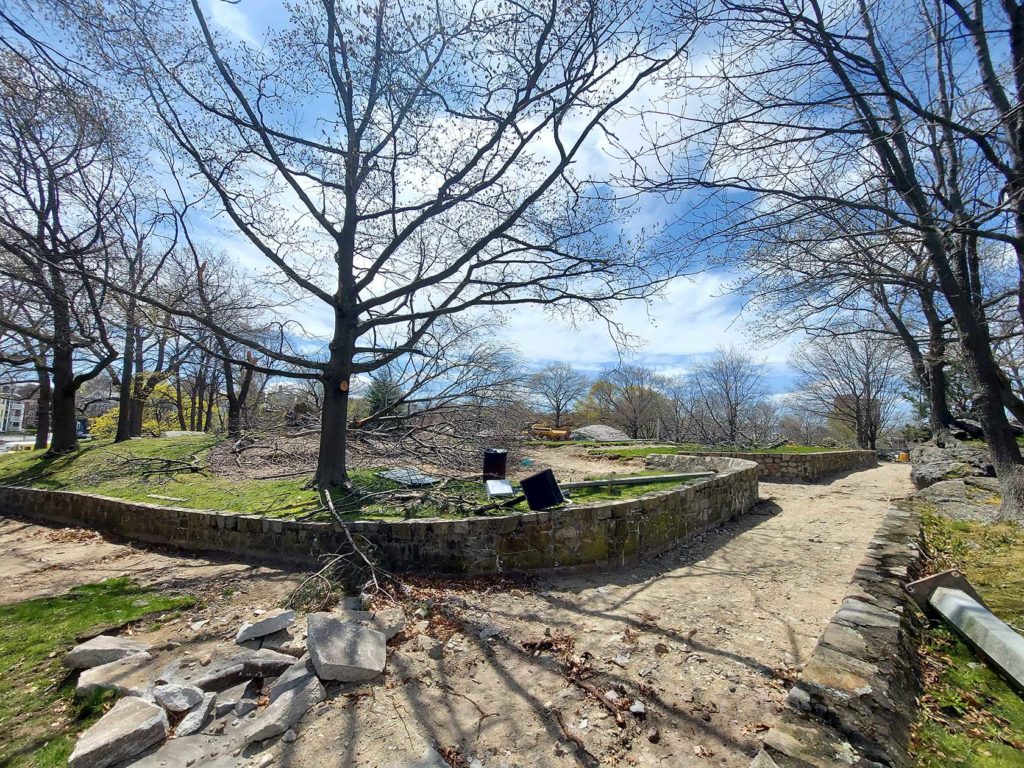
On an ordinary spring afternoon, Malcolm X Park would be humming with activity. Its basketball courts and baseball diamond host league games, pickup games, barbeques and hangouts that can last late into a warm night.
Now fenced off by a contractor, last week the park was mostly empty, save for a dozen or so men lounging and shooting baskets, thanks to a gap in the fencing, and surrounded by the rubble of torn-up concrete walkways and stone walls leveled by the excavators that began work on the park in March.
“They better be finished soon,” said Scott Mart, speaking while shooting baskets. “It’s almost summer.”

Scott Mart shoots baskets at Malcolm X Park. BANNER PHOTO
The construction, originally scheduled to last nearly a year, may take longer. After contractors marked 54 mature trees for removal in the park, which was designed by Frederick Law Olmstead in the late 1800s, abutters to the park raised objections to a project they said has more than trebled in cost from an original estimate of $2.5 million to $8.5 million.
Construction has ceased and Mariama White-Hammond, the city’s chief of environment, energy and open space, says the project is now two months behind schedule and may push into next summer.
The planned culling of the trees, many of which date back to the original construction of the park, has become somewhat of a rallying cry for the abutters, who have called on the Parks department to halt the project. Buckeyes, horse chestnuts, elms, oaks and white pines have been painted with bright orange X marks, indicating they are to be cut down.
At issue, according to city officials, is the steep grade of the paths that dissect the Honeysuckle Hill portion of the park. Because of the steepness of the hill, the paths are not compliant with the Americans with Disabilities Act. Trees that are near the paths will inevitably see their roots severed as the paths are excavated, killing them.
Although no trees have been put to the chainsaw, one large tree toppled over after a contractor severed its roots while excavating a path.
Abutter Derrick Evans said the removal of trees and regrading of paths would never happen in a downtown park such as the Boston Common.
“It would be fundamentally different,” he said. “Right now, they’re doing construction on the Esplanade with large trees around paths that are ADA non-compliant,” he said. “The expectation is that if you’re in a wheelchair, you’ll take a different path.”
Evans sees the regrading of the paths in Malcolm X Park as “overly-strict, overly-engineered ADA compliance.”
“It’s overkill,” he said.
White-Hammond said the scope of the work in the park is expansive enough to force compliance with ADA regulations. While not all paths will be regraded, every feature of the park is required to be accessible to people with disabilities.

A tree fell after heavy machinery damaged its roots. BANNER PHOTO
“In the past, we tended to do one element in a park,” she said. “The amount of work was enough to make one element accessible.”
The city is facing similar issues on the Boston Common. There are currently two sets of stairs flanking the Massachusetts 54th Regiment bass relief monument. The Parks Department is dismantling one set of stairs to install a wheelchair accessible ramp. Regrading of paths is taking place in Mother’s Rest Park and Garvey Park, as well, White-Hammond noted.
White-Hammond said the city’s original push to remove 54 trees came in order to create elements community residents asked for in the park, including a water park in the playground, a new fence on the eastern side of the park and an amphitheater-like outdoor classroom space near the Higginson-Lewis school building.
When residents asked for the elements, Parks Department officials did not know the total number of trees they would be required to remove in order to install them, White-Hammond said.
After negotiating further with residents in more recent meetings, Parks Department officials now say they will have to cull only 30 trees.
In every instance, White- Hammond says, there are tradeoffs.
“Some people say, ‘Our kids should have an outdoor classroom,’” she said. “Some people say, ‘Save the trees.’”
Artificial turf
The conversion of the park’s athletic fields into artificial turf also has sparked backlash from some residents.
An August 2020 Parks Department analysis that found softball to be by far the most frequent use of the field, with 849 hours played per year, while soccer clocked in at just 75 hours. Yet area residents who attended meetings in 2020 and 2021 demanded the artificial turf field, citing its use in other parks around the city. Artificial turf enables teams to play more days, as it does not turn to mud after it rains, Hammond noted.
Under the new plan, one of the two baseball diamonds would be eliminated to create two side-by-side soccer fields.
The elimination of the second baseball diamond was necessary, White-Hammond noted, because elderly residents had requested a walking track that would go around the playing fields, leaving less space for the fields.







